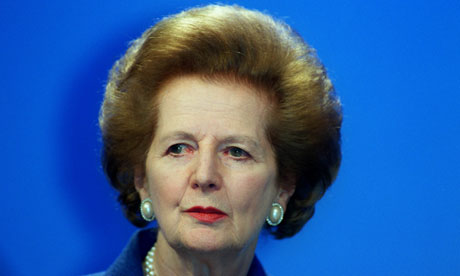Would we have had social enterprise without Margaret Thatcher?
Thatcherism taught us that a mixed market in the public sector is the future, and that a 'state or market' debate is outdated

Margaret Thatcher – a key figure in the history of the social enterprise movement? Photograph: Sportsphoto Ltd./Graham Whitby-Boot/Allstar
There probably aren't many Margaret Thatcher fans among social entrepreneurs, with most attributing the growth of market economics in social arenas to the measures introduced by Tony Blair. But would we have had the Right to Request without de-nationalisation or the Right to Buy?
As Ed Miliband said during parliament's tribute sitting, Thatcher was right to recognise that our economy needed to change. In 1982, she said:"How absurd it will seem in a few years' time that the state ran Pickfords removals and the Gleneagles Hotel."
Thatcher introduced the idea that government should stop being the default employer and that the public sector needed mixed models of delivery – thinking that has been shared by successive governments ever since.
Looking at public sector reform through the point of view of theTransition Institute, set up to promote increased social value in public service created through non-public sector providers, we can see two major spikes in change; the first when Thatcher allowed the private sector to enter the domain of public services such as in municipal maintenance and waste collection; and the second when Blair introduced the concept of social enterprise into education, health and the then Department of Trade and Industry.
At my organisation, the Transition Institution, we know that the market economy drives down costs but can also fail if equal priority is not given to the needs of service users and the wider community, termed social value. Our work shows what can be achieved when the priority of cost effective services are shared with the needs of those that rely on services. We promote the work of co-operative schools, staff-led community interest youth services, and mutual delivery of community care.
The Transition Institution calls for plurality, a drive for an increase in social and economic value, demonstrating the coexistence of free market forces and social responsibility. The introduction of the Public Services (Social Value) Act 2012 and the support of the cabinet office, led by Francis Maude, for the promotion of mutuals within the public sector have encouraged those seeking change in this field, but progress is slow.
Thatcher was perhaps the great advocate of the free market, even though employment in the public sector was 3% higher when she left office than it is now. She undoubtedly questioned the monopoly of the state and did not limit her introduction of market forces to the nationalisation of British Airways, British Gas and British Telecom, but went on to assert that the state can not commission, deliver and appraise every service without the emergence of a conflict of interest that does not serve the wider public, an idea continued under Blair.
In 2011, David Cameron said: "The Blair government took some good steps, like foundation hospitals and academy schools, but they were too tentative … The public already benefits from services delivered by private and third sector providers, from running walk-in clinics to providing school caretakers, and the government is right to recognise that there is scope to do more."
Yet even with that commitment and other stated aims to grow mutualism, social value and community engagement, we have yet to see a third spike. Many prospective and new public sector spin-outs continue to be confronted by sceptical parent authorities and voracious private sector competitors with the advantage that they can get in quick. As in Thatcher's era, it is money that counts: then inflation hit 21% and drove the government to think the unthinkable. Today, it's the deficit and, with banks limiting borrowing, those with access to capital are moving faster. I do not have the results of the 2013 national Transition Institute surveyyet, but I am willing to guess that access to capital is a big issue for today's independent public service providers.
Margaret Thatcher introduced an idea that continues to grow, that of a mixed market in the public sector. Her scepticism about the public sector led to a deep-seated faith, shared by some in government today, that only unfettered competition can give us quality and affordability. In contrast, some on the left maintain that only the state can care for its citizens.
This is 2013 not 1983 and if the banking crisis and subsequent recession have taught us anything, it is that it may be hard to describe and tricky to measure but what the public sector needs is a mixed approach – only a combination of competition tempered by social value can create affordable and sustainable world-class public services.
Allison Ogden-Newton is chair of the Transition Institute.

No comments:
Post a Comment